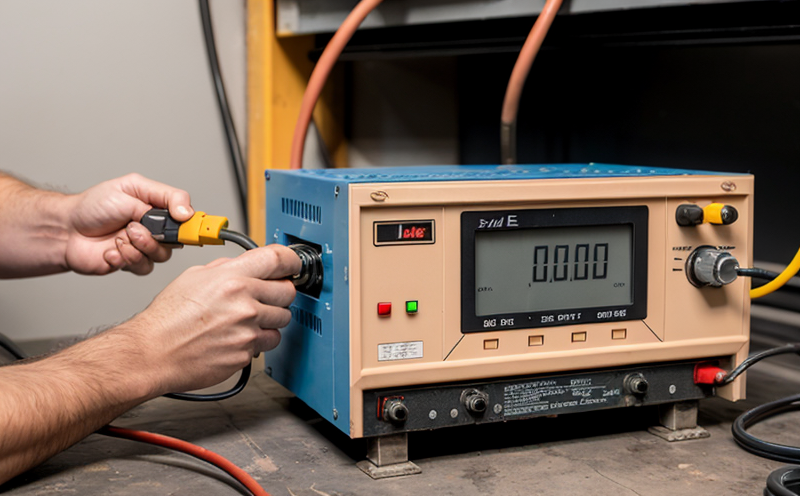JEDEC JESD22 Die Functional Characterization Testing
The JEDEC JESD22 Die Functional Characterization Test is a critical process in semiconductor and microchip development. This test ensures that individual die meet the functional requirements defined by industry standards, thus ensuring reliable performance before integration into larger assemblies. The test evaluates each die's electrical characteristics under various operating conditions to identify potential defects or inconsistencies.
The JESD22 standard is designed to address the specific challenges of testing microchips at the die level, where the focus is on individual units rather than finished packages. This approach allows for more precise identification and correction of issues before they manifest in final products, thereby enhancing overall quality control and reducing manufacturing costs.
The testing process involves several key steps: initial die placement onto test fixtures, application of specific voltages and currents as per the standard, monitoring of resulting signals, and comparison against predefined acceptance criteria. These tests are conducted at various temperatures to simulate real-world operating conditions accurately.
One critical aspect is the use of specialized equipment capable of handling extremely small components while maintaining accuracy. The setup typically includes advanced measurement instruments that can capture detailed data on die performance during operation. This information helps engineers make informed decisions about design improvements or process adjustments needed for better yield and reliability.
The importance of this testing cannot be overstated, especially considering the increasing complexity and miniaturization trends in modern electronics. By ensuring each individual die meets stringent specifications early in the production cycle, manufacturers can significantly reduce downstream failures and improve overall product quality.
| Industry Application | Description |
|---|---|
| Data Center Infrastructure | Ensuring optimal performance of servers and storage devices. |
| Automotive Electronics | Guaranteeing safety-critical components operate reliably under all conditions. |
| Consumer Devices | Maintaining high standards for durability and functionality in consumer electronics. |
The application of JESD22 testing extends beyond just manufacturing; it also plays a crucial role in research and development phases by providing insights into how different materials or designs affect die performance. This knowledge is invaluable when optimizing processes for higher efficiency or exploring new technologies.
- Data Center Infrastructure: Ensures optimal performance of servers and storage devices.
- Automotive Electronics: Guarantees safety-critical components operate reliably under all conditions.
- Consumer Devices: Maintains high standards for durability and functionality in consumer electronics.
In summary, the JESD22 Die Functional Characterization Testing is an essential step in semiconductor manufacturing that guarantees each individual die meets rigorous functional requirements. By leveraging this testing method early in the production process, companies can enhance product reliability, reduce waste, and meet market demands for high-quality electronic components.
Scope and Methodology
The scope of JESD22 testing encompasses a wide range of parameters that are critical to the functionality of semiconductor devices. The methodology involves subjecting individual die to controlled electrical and thermal environments, simulating real-world conditions in which they will operate.
During the test, various electrical characteristics such as resistance, capacitance, and leakage current are measured at different temperatures. These measurements help identify any discrepancies between expected values and actual readings, indicating potential issues within the die itself or during its assembly process.
The testing procedure is designed to be comprehensive yet efficient, ensuring thorough examination without excessive time investment per unit tested. The use of automated systems allows for consistent execution across multiple samples simultaneously, further enhancing accuracy and repeatability.
A typical test setup includes a programmable power supply capable of delivering precise voltages and currents, along with high-precision measurement instruments such as oscilloscopes and multimeters. These tools provide detailed insights into the behavior of each die under various operational scenarios.
After completing all necessary tests, results are analyzed against predefined acceptance criteria specified in JESD22 standards. Any deviations from these benchmarks indicate non-conformity with industry expectations, necessitating further investigation or corrective actions.
The entire process is meticulously documented to maintain traceability and provide a comprehensive record of each die's performance during testing. This documentation serves not only as proof of compliance but also as valuable input for continuous improvement efforts within the manufacturing facility.
Industry Applications
The JESD22 Die Functional Characterization Testing finds extensive application across multiple sectors, particularly where high reliability and stringent quality control are paramount. Here are some key areas:
- Data Center Infrastructure: Ensures optimal performance of servers and storage devices.
- Automotive Electronics: Guarantees safety-critical components operate reliably under all conditions.
- Consumer Devices: Maintains high standards for durability and functionality in consumer electronics.
In addition to these primary sectors, JESD22 testing is also utilized in other fields such as industrial automation, medical instrumentation, and telecommunications equipment. By ensuring each die meets the required functional specifications early in the production process, manufacturers can significantly reduce the likelihood of field failures, leading to enhanced customer satisfaction and brand loyalty.
International Acceptance and Recognition
The JESD22 Die Functional Characterization Testing is widely recognized globally due to its rigorous standards and consistent results. This testing procedure aligns closely with international norms set forth by organizations like the International Electrotechnical Commission (IEC), American Society for Testing and Materials (ASTM), and European Committee for Standardization (CEN).
Many leading semiconductor companies worldwide adopt JESD22 as part of their quality assurance protocols. The standard's broad acceptance ensures that products tested meet not only local but also international standards, facilitating smoother trade between countries.
The consistent application of this testing method across different regions helps maintain uniformity in product specifications and performance metrics, which is crucial for industries reliant on interoperability among various components from diverse suppliers.





